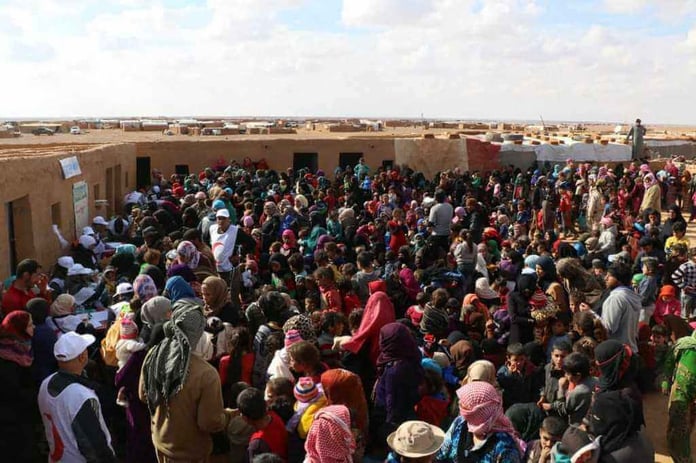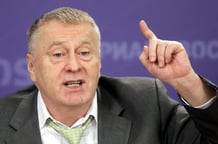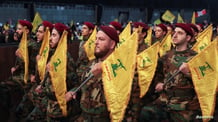
Within a geographical spot located on the border triangle between Jordan, Iraq and Syria, thousands of civilians reside in a camp called “Al-Rukban”, and for more than two years no humanitarian aid has entered them.
They are forgotten, no one knows about them, besieged from all sides, so that it was enough that the “Corona” virus could not enter their circles, since the beginning of the pandemic in the country and the world.
These people are living in extremely tragic conditions, according to the head of the “Al-Rukban” local council, Ahmed Al-Khalidi. To the east (Iraq), to the north and west, there is the Syrian regime and Iranian militias.”
Three days ago, the name of the camp was suddenly repeated, as five “empty” trucks belonging to the United Nations entered, in order to transport families wishing to leave to areas under the control of the Syrian regime.
Despite the families’ rejection of the exit process, this will not prevent other attempts, according to Al-Khalidi, who explains that they recently received a letter from the “OCHA” office in the capital, Damascus, in which they were informed that the latter had started an “evacuation mission” to support the voluntary departure of the people, over a period of time. Next three months.
Al-Khalidi, who resides in Rukban, adds: “The provisions of the book are clear. There is no guarantee for anyone who wants to leave the areas controlled by the Syrian regime. However, there are people who want to get out of death into another death, because of starvation and the multiplicity of diseases.”
No clear guarantees
The book, a copy of which was viewed by The Eastern Herald, stated that the United Nations, with the help of the Syrian Arab Crescent, will support the “voluntary” departure of those who have expressed their willingness to leave the Rukban camp to the areas of their choice, through the Homs shelter, after signing the agreement. quarantine.
The book added that “the United Nations is doing everything in its power to complete this task as soon as possible. The departures will take place in batches and for a period of three months.”
With regard to ensuring the safety of those who wish to leave the camp, the United Nations indicated in its book that “the responsibility for the security and safety of individuals lies with the controlling parties and the government of the Syrian Arab Republic. After the families leave the camp, they will be transferred to shelters in Homs, and then they must obtain approval from the authorities to choose the next destination.
The al-Rukban camp is located on the 55-kilometer area, which is controlled by the “Maghawir al-Thawra Army” forces with the support of the international coalition.
Over the past months, the calls and statements of Russian officials, for the dismantling of the “Rukban camp”, have been remarkable.
Among those calls, the head of the National Defense Administration Center of the Russian Defense Ministry, Mikhail Mizintsev, said that a new operation was developed to evacuate the displaced from Rukban, which is located on the Syrian-Jordanian border.
He added last June: “The Syrian government has prepared temporary accommodation centers for those who want to leave the camp,” noting that the details of the evacuation of civilians have already been agreed upon, and the United Nations is ready to provide the vehicles in turn.
On the other hand, the director of the media office of the “Mahawir Al-Thawra Army”, Abdul Razzaq Khader Al-Mahya, said: “As for the commandos, they had no role other than protecting the cars and delivering them to the camp gate.”
He added in an interview with Arab media: “The trucks that entered recently left empty, after the drivers were attacked by people inside the Rukban camp.”
Families are forced
Since March 2020, Jordan has closed the only medical point that provided first aid and received critical deliveries, and closed the borders as part of its measures to limit the spread of the “Corona emerging” virus.
Despite appeals to introduce some emergency cases after the medical point was closed, camp officials did not receive any response from the Jordanian authorities.
A week ago, the young Saud Subhi Al-Talib, 37, died as a result of the appendix rupturing, according to the diagnosis of the nurses at the Sham Medical Clinic, located in the camp.
“Today, there is no medical staff in the camp, after the Kingdom of Jordan closed the only medical point on the border,” said Ahmed Al-Khalidi, head of the local council in Rukban.
He added that the people of “Rukban” had not received any humanitarian aid for more than two years, while the siege was completely applied to it, noting: “We are in a barren desert. There are no crossings, or agriculture or trade. The whole ocean surrounds us, and the situation is from bad to worse.” .
The camp, which was established in 2014, hails from the countryside of Raqqa, Deir ez-Zor, Homs and Hama.
While there are no exact figures on the number of people living in it, Al-Khalidi indicates that it exceeds the 10,000 mark.
For his part, the media activist, Hamoud Abdullah, spoke of an individual exit from the camp towards the areas controlled by the Syrian regime.
In an interview, he explained: “A week ago, 40 people left, due to the difficulty of life and the lack of resources. Families are forced to do so, and they have no options.”
Amnesty International warns
Meanwhile, in conjunction with the steps initiated by the United Nations to facilitate the process of transferring families to areas under the control of the Syrian regime, Amnesty International issued a report warning of the consequences of this matter.
“The United Nations plans to facilitate the transfer of people from Rukban to shelters in Homs, where they will be quarantined for 14 days,” the report said.
It is not clear how many people will be transferred from Rukban in the next phase, if the UN-led return process continues.
Amnesty International urged the United Nations and the Syrian Arab Red Crescent not to proceed with these returns, which will undoubtedly endanger the women, men and children living in Rukban.
Our research shows that “Syrian authorities specifically targeted returnees from Rukban, accusing them of terrorism before exposing them to serious human rights abuses,” said Marie Forestier, a researcher on refugees and migrants at the organization.
Journalist, Muhammad Hassan al-Ayed says that the moves to transfer families followed the great emphasis on “smuggling routes” that crossed towards the Rukban camp and the 55 area.
Al-Ayed said in an interview: “The roads through which food and medical supplies were passing. Unfortunately, they have been completely closed recently.”
The Syrian journalist spoke about arrests carried out by the Syrian regime forces against people who had arrived in his areas, coming from the camp in the past months.
Among the detainees is Muayyad Obaid, who is considered one of the notables of the city of Al-Qaryatayn. The journalist notes: “After conducting the settlement and reconciliation process, he was arrested, and his fate has not been known for more than a year and a half.”
Al-Ayed added: “Recently, about 40 people went to the Syrian regime-controlled areas in the Al-Sawwana oasis in the eastern countryside of Homs. Those who are transferred are subjected to security searches and other arrangements that may end in arrest.”













